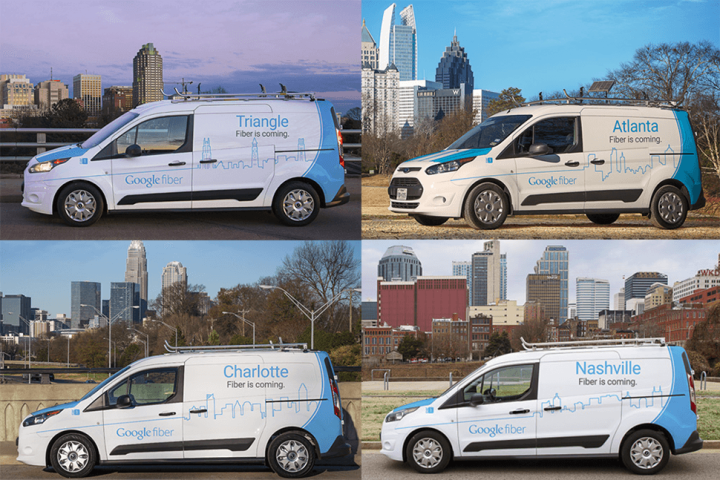
Google stated that construction in the latest confirmed cities will begin once mapping has been laid out, which will likely take place in a few months. This accelerates Google Fiber’s progress from what once was a tepid trickle, to something more like a steady (if not wholly reliable) stream.
The announcement is a timely one considering the current state of broadband in the U.S., which has long been held captive by major multi-system operators like Comcast and Time Warner Cable. A few massive conglomerates dictate Internet speed limits, and the infrastructure that provides them. Meanwhile, as the GOP argues that the FCC’s new definition of standard broadband speeds set at 25Mbps download and 3Mbps up is unnecessary, Google (and plenty of others) respectfully disagrees.
In a conference call about Google Fiber’s latest expansion plans today, Google Fiber’s Dennis Kish noted that his time overseas in Singapore and Amsterdam lead to his decision to join Google Fiber. Kish recalled that both cities offered faster Internet than he could find in the U.S., both before and after his time abroad. In fact, as Kish remarked, though the U.S. may be a titan when it comes to technological innovation, the country resides at a lowly number 14 when it comes to world broadband rankings.
Google continues to claim emphatically that Fiber’s Gigabit Internet, which boasts wired speeds of up to 100 times faster than the U.S. average (and Wi-Fi speeds at about a third to half that rate) is good for everyone: consumers, businesses, and Google itself. That business demographic is where Fiber has shined brightest so far. Kish cited early research from the Fiber to the Home Council that claims the availability of Gigabit Internet in 14 cities (many of which comes from other providers) has created $1.4 billion in additional GDP revenue.

Kish pointed to other consumer and business benefits, including higher engagement with companies that are doing business over the web, as well as what Google calls the “rising tide” effect of bandwidth abundance: the more places Gigabit speeds are available, the more innovation and creativity will arise around what the Internet could become in the near future. Kish and Google firmly believe that “the next chapter of the web is going to be written on Gigabit speeds.”
The appeal of Google Fiber’s companion Fiber TV service is also an undeniably attractive factor as well. The service offers a veritable smorgasbord of HDTV channels, stellar picture quality, and next-gen networking equipment that helps to make sure every corner of a home gets outstanding TV and Wi-Fi service, all for a fairly reasonable price.
Where’s my Fiber?
So what does it take to bring Fiber to your town? That’s a tough question that we put directly to Kish, and not surprisingly, he did not give a definitive answer. While Google’s nebulous list of tasks required to court the tech giant’s new gift of The Gig to your city is reportedly laid out on the Fiber website, it’s hard to nail down exactly what it takes.
Apparently, it helps to be a South Easterner. Or, perhaps more to the point, South Easterners are good at getting things done. Four out of Google’s soon-to-be seven Fiber cities are now located in a cluster in the South Eastern US. Kish did offer a few broad reasons for Google’s latest destination cities on the Fiber Train: “Many have emerging startup scenes, growing small business communities, and research, healthcare, and technology industries,” Kish said. But that’s just part of the equation.

As Kish explained, each time Fiber moves into a new city, the company has to lay “thousands of miles” of Fiber optic cable. How fast that happens, and how easily it is to get done, depends on multiple factors, including local infrastructure grids and layouts, third party builders and construction workers, and the streamlining of permit processes. And while Kish didn’t mention it specifically, tax incentives likely play a role as well.
With Portland listed as an exploratory city, we at Digital Trends admittedly have a dog in this fight to attract Google Fiber. We asked Kish directly why the latest South Eastern cities were chosen over other contenders, and he had no real answer. He did say the additional cities have made “great progress,” as well as promising that more cities will be announced later this year.
For now, if you live in one of the 5 potential cites, today is either a day to celebrate hope, or lament yet another disappointment. But make no mistake, one way or another, the Gig is coming. Just what that will mean to the somewhat precarious future of the Web is, for now, anyone’s guess. But there’s no doubt that much of the country is screaming for more choices when it comes to Internet providers. And most of us would love to be a part of Google Fiber’s new rising tide.
Editors' Recommendations
- Google is changing everything you know about Chromebooks
- Google Fiber is bringing high-speed internet to five new states
- A zero-day Google Chrome security flaw requires you to update now
- You can now video chat with up to 32 people on Google Duo
- Update your Google Chrome browser now: New exploit could leave you open to hacks


